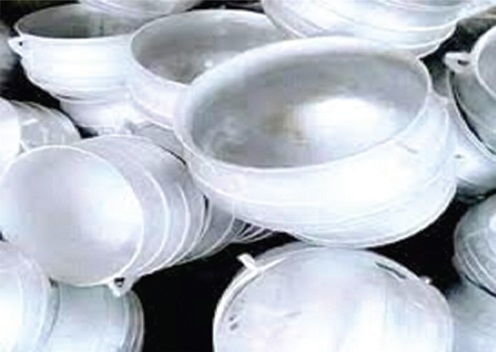
Do Aluminium cooking pots cause cardiovascular disorders?
Cooking pots and other kitchen utensils made of aluminium have been a common household commodity for ages, especially in our part of the world.
A recent report online on the subject matter has, however, sounded caution to the general public on the use of these aluminium cooking pots due to a myriad of reasons.
The report, by Occupational Knowledge International (OK International), a non-profit environmental organisation based in San Francisco, and published locally, is titled: “Metal exposure from source materials for artisanal aluminium cookware”.
Their findings indicate alarming levels of lead and other metal exposure from cookware, popularly known as aluminium cooking pots or ‘dadesen’ in Ghana.
We take a critical look at Nonstick cookware in general as they contain a man-made chemical called perfluorooctanoic acid, also known as PFOA or C8.
According to the American Cancer Society (2020), “PFOA has the potential to be a health concern because it can stay in the environment and in the human body for long periods of time. Studies further have found that PFOA is present worldwide at very low levels in just about everyone’s blood.”
Animal studies have also presented a link between PFOA exposure and cancer development.
According to a 2017 report by the Centres for Disease Control and Prevention (CDC), “In laboratory animals given large amounts, PFOA can affect growth and development, reproduction and injure the liver.”
Thus, in addition to cancer concerns, there are some other highly serious health repercussions including liver damage, infertility and delays in growth and development that could result from PFOA exposure.
Aluminium?
According to the Health Library (2020), aluminium toxicity occurs when a person ingests or breathes high levels of aluminium into the body.
A retrospective scientific report led by Aguilar et al. (2008) found that aluminium is naturally occurring in most foods, including fruits, vegetables, meats, fish, grains and dairy products.
The report also found that some of the aluminium we consume comes from processed food additives, such as preservatives, colouring agents, anti-caking agents and thickeners.
The interesting thing is that another retrospective study by Saiyed & Yokel, (2005) and one prospective study by Sato et al. (2014) found that commercially produced foods containing food additives may contain more aluminium than home-cooked food.
Aluminium cooking pots?
Most of your aluminium intake comes from food (Soni et al. 2001; Bassioni et al. 2012).
This notwithstanding, studies have affirmed that aluminium foils, cooking utensils and containers can leach aluminium into our food (Soni et al. 2001; Bassioni et al. 2012).
Aluminium foils may also increase the aluminium content of your diet. The amount of aluminium that passes into your food when you cook with aluminium foils, for instance, is affected by a number of things such as:
• Temperature: Cooking at higher temperatures
• Foods: Cooking with acidic foods, such as tomatoes, cabbage and rhubarb
• Certain ingredients: Using salts and spices in your cooking
However, the amount that permeates your food when cooking can vary. For example, one study by Turhan (2006) found that cooking red meat in aluminium foils could increase its aluminium content by between 89 per cent and 378 per cent.
This creates concern in a prospective study by Bassioni et al. (2012), which found regular use of aluminium foils in cooking to be harmful to health.
However, another study by Willhite et al. (2014) also found no strong evidence linking the use of aluminium foil with an increased risk of disease.
Health risks too much aluminium
It is newsworthy to note that the daily intake of aluminium through food and cooking is regarded as safe.
This is supported by one study by Krewski et al., (2007), which found that healthy people can efficiently excrete the small amounts of aluminium the body absorbs. High levels of aluminium have been found in the brains of people with Alzheimer’s.
A study by Soni et al., (2001) failed to establish any causation between high aluminium intake as the cause of the disease.
Reducing exposure to aluminium when cooking
Aluminium cannot be completely removed from our diet. We can, however, reduce the risk of exposure.
In 2011, The World Health Organisation (WHO) and Food and Drug Administration (FDA) reached a consensus that levels below 2 mg per 2.2 pounds (1 kg) body weight per week are unlikely to cause health problems.
Also, The European Food Safety Authority employs a more conservative estimate of 1 mg per 2.2 pounds (1 kg) body weight per week.
Interestingly, studies by Greger, (1992) and Cuciureanu et al. (2000) have affirmed that we consume far less than these notable organisations considered as the safe threshold.
The following recommendations can avert your risk of aluminium exposure:
• Avoid high-heat cooking: Foods should be cooked at lower temperatures whenever possible.
• Use less aluminium foils: Reduce your use of aluminium foils for cooking, especially if cooking with acidic foods such as tomatoes or lemons.
• Use non-aluminium utensils such as glass, cast iron, stainless steel, Copper or porcelain dishes and utensils. There are also “Green cookware” which you can consider using.
• Avoid mixing aluminium foils and acidic foods: Liukkonen-Lilja & Piepponen (1992) study recommends not exposing aluminium foils or cookware to acidic foods such as tomato sauce or rhubarb.
The writers are the President, Nyarkotey College of Holistic Medicine & Technology (NUCHMT)/African Naturopathic Foundation & Lawrencia Aggrey-Bluwey, PhD student, University of Ghana Business School. E-mail: collegeofholisticmedicine@gmail.com.
